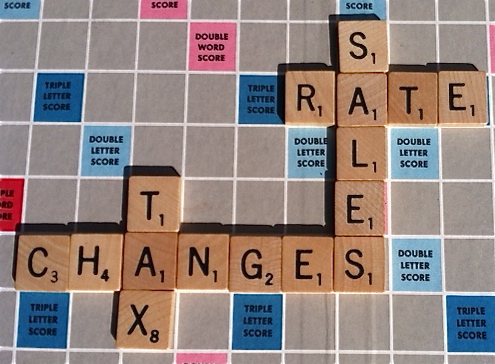19 Jun
2014

Tax Changes for Small Business in 2014 – Here is 8 of them
Small business owners are always looking for ways to reduce their tax bills. With yearly tax changes, here are 8 changes from the Federal Budget and ones under proposal.
1. Individual tax rate changes from 1 July 2014
From 1st July 2014, those earning $180,000 and over will be taxed an additional 2% Temporary Budget Repair Levy. This applies to every dollar earned over $180,000.
Two tax offsets will also be abolished from 1 July 2014
•Dependent Spouse Tax Offset
•Mature Age Worker Tax Offset
Employers need to obtain a payroll update from their accounting software provider for these changes.
2. Superannuation rates to increase to 9.5% from 1 July 2014
Superannuation rates will increase to 9.5% from 9.25% from 1 July 2014. It will remain at 9.5% until July 2018.
3. Instant asset write offs reduced to $1,000 from 1 January 2014
Under the current law, a small business can claim an immediate tax deduction for “individual” assets costing less than $6,500 ex GST including individual assets that form part of a set. As part of the changes contained in the “Mining Tax Repeal Bill”, the Government has proposed to reduce the instant asset write-off from $6,500 to $1,000 for “individual” assets “first used or installed ready for use” on or after 1 January 2014.
4. Accelerated depreciation for motor vehicles repealed from 1 January 2014
Under the current law, a small business can claim an accelerated depreciation tax deduction of $5,000 ex GST for new or second hand motor vehicles acquired during the year. Where the cost of the vehicle is $6,500 or more (GST exclusive), an immediate deduction can be claimed for both the first $5,000 plus 15% of the cost less $5,000. The balance of the purchase price is depreciated as part of the asset pool at a rate of 30% in the second and subsequent years.
As part of the “Mining Tax Repeal Bill”, the Government has proposed that the $5,000 threshold will be reduced to $1,000 for vehicles first used or installed ready for use” on or after 1 January 2014.
Where a vehicle was acquired prior to 1 January 2014, but was first used or installed ready for use after this date, the instant asset write-off threshold of $1,000 applies. Where the purchase of a vehicle meets the “use or installed” test up to 31 December 2013, the current more favourable rules still apply as outlined above.
5. Increase in Medicare levy to 2% from 1 July 2014
The Medicare levy for individual resident taxpayers will increase from 1.5% to 2% of taxable income from 1 July 2014. Fortunately, the Medicare levy surcharge remains the same, currently imposed at a rate of 1.5% to 2% (depending on the income levels and marital status of the individual resident taxpayer). The surcharge applies to those without adequate private health insurance cover. Employers will be required to install new tax rates tables into their payroll software that apply from 1 July 2014 to capture this increase in Medicare levy.
6. Increase in 2015 Fringe Benefit Tax (FBT) rate & gross-up rates from 1 April 2014
Due to the increase in Medicare levy, a new FBT rate and also gross-up rates will apply from 1 April 2014 (i.e. the 2015 FBT year and following). They are as follows:
•2015 FBT rate is 47% which is an increase of 0.5% from the 2014 FBT year
•2015 Gross-up rates:
•Type 1 benefits grossed-up by 2.0802 (increased from 2.0647)
•Type 2 benefits grossed-up by 1.8868 (increased from 1.8692)
Employers will need to ensure that they review and adjust employee salary packages to take into account these changes (if permitted under the employment contact).
Note that following the introduction of the Temporary Budget Repair Levy that applies at a rate of 2% on individuals’ taxable income in excess of $180,000 per annum as announced in the 2014 Federal Budget, the FBT rate will be further increased from 47% to 49% from 1 April 2015 until 31 March 2017 to align with the FBT year
7. Changes to age-based concessional superannuation caps from 1 July 2014
The concessional (tax deductible) superannuation contribution caps for the 2013/14 year based on an individual’s age are:
•Age 60 and over on 30 June 2014 have a $35,000 contribution cap
•Age 59 and under on 30 June 2014 have a $25,000 contribution cap
The concessional superannuation caps for the 2014/15 year based on a person’s age have changed as follows:
•Age 49 and over on 30 June 2014 have a $35,000 contribution cap
•Age 48 and under on 30 June 2014 have a $30,000 contribution cap
The employer super guarantee contributions and salary sacrifice contributions are included in these caps.
8. Repeal of company loss carry back rules effective from the 2014 income year
In the 2012 Budget, the Government announced rules, with effect from the 2013 income year, that allow companies and entities taxed like companies, to carry tax losses incurred in the current year back to prior income years and receive a refund in that year.
For the 2013 income year, a transitional rule applies whereby companies are able to carry back up to $1 million of tax losses incurred in the 2013 income year to recoup up to $300,000 ($1M * 30%) of tax paid during the 2012 income year.
The Government has proposed a legislation to repeal the loss carry-back rules with effect from the 2014 income year. Accordingly, companies will only be able to apply these rules for the 2013 income year. It’s unlikely that this legislation will be passed by the Senate and made law prior to 1 July 2014.
Remember
The information provided here is of a general nature for Australia and should not be your only source of information. Please consult an experienced and registered tax agent as each small business’ circumstance will vary for end of financial year.
This article was written by Joe Kaleb and originally appears on MYOB.com.au
It is important that your are aware of the Tax Changes for Small Business in 2014




